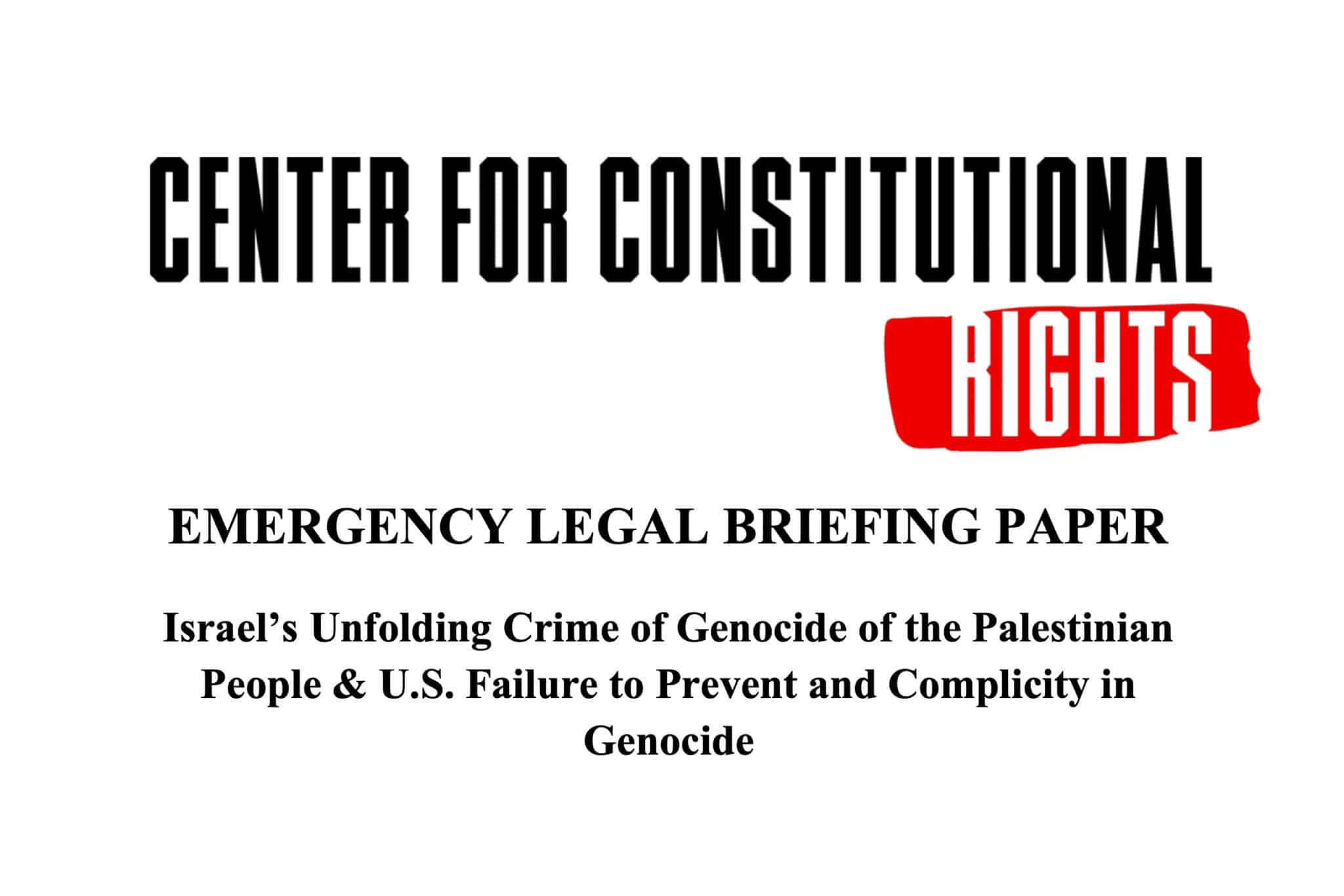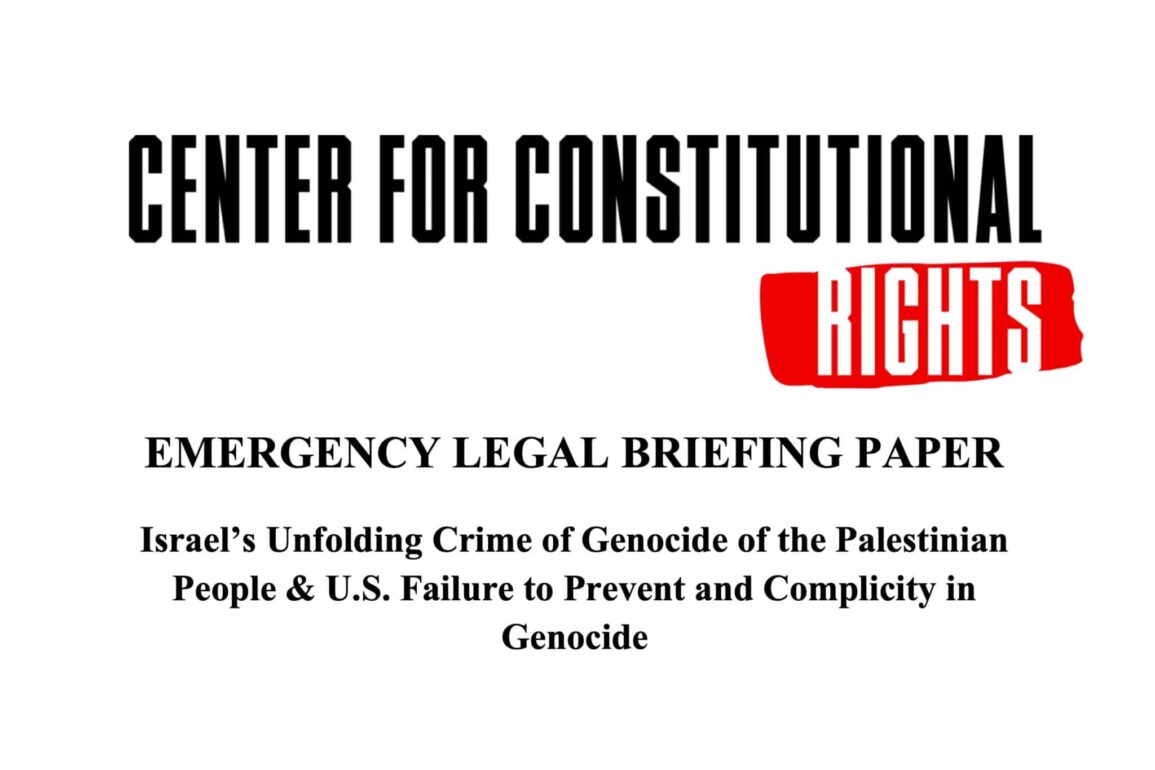
I am here like an olive tree. We will never leave our homeland.
– Raji Sourani*
1. INTRODUCTION
There is plausible and credible case, based on powerful factual evidence, that Israel is attempting to commit, if not actively committing, the crime of genocide in the occupied Palestinian territory, and specifically against the Palestinian people in the Gaza Strip.1 The gravest of crimes under international law, genocide refers to specific actions – such as killing or deliberately inflicting conditions of life calculated to bring about the destruction of the group in whole or in part – taken with the intention of destroying, in whole or in part, the group targeted, including on ethnic or national grounds.
Since October 7, 2023, Israel has escalated its 16-year closure over 2.2 million Palestinians in Gaza where approximately half the population is under 18, indiscriminately and repeatedly bombing civilians while cutting off access to all basic necessities, including food, water, electricity, and medical supplies, and on October 13th ordered a forced “evacuation” of 1.1 million Palestinians out of northern Gaza.
As this briefing paper was being finalized on the evening of October 17, 2023, there were an estimated 500 fatalities following a reported Israeli airstrike at Al-Ahli Arab Hospital in Gaza City where many were seeking shelter. Excluding those killed at Al-Ahli Hospital, as of October 17, 2023, the Palestinian Ministry of Health has confirmed that 3,000 Palestinians have already been killed, including at least 1,030 children and hundreds of family units; in 11 days, more than 12,500 people have been injured, one million Palestinians displaced, and thousands of homes destroyed, with reports of 1,200 missing people believed to be trapped under the rubble. As set forth below in both the detailed factual overview and the Findings, Israeli officials have made statements revealing that these actions are for the purpose of destroying the Palestinian population in Gaza.2 This presents a plausible and credible case of a breach of the Genocide Convention.
Like both Palestine and Israel, the United States is a signatory to the 1948 Convention on the Prevention and Punishment of the Crime of Genocide, the first human rights treaty adopted by the United Nations General Assembly and considered the building block of the international human rights system.3 The Genocide Convention places a duty on all 153 signatories to both prevent and punish genocide.4 The Convention criminalizes not just the commission of genocide, but incitement and attempts to commit genocide, as well as complicity in genocide, which is discussed below in detail. Israel, the United States, and indeed, all States, must immediately comply with their obligations under the Convention.
The United States has been obligated, from the time learning of the serious risk of genocide of the Palestinian people, to exercise its influence on Israel to prevent the crime. The United States is not only failing to uphold its obligation to prevent the commission of genocide, but there is a plausible and credible case to be made that the United States’ actions to further the Israeli military operation, closure, and campaign against the Palestinian population in Gaza, rise to the level of complicity in the crime under international law.
The United States – and U.S. citizens, including and up to the President – can be held responsible for their role in furthering genocide. Any individual who commits, incites, conspires to commit or is complicit in genocide can be held liable under international law – including before the International Criminal Court (“ICC”),5 which already has an open investigation into crimes being committed in Palestine6 – or under U.S. law.7 The International Court of Justice (“ICJ,”) also known as the World Court, which is empowered to resolve disputes between signatory States to the Genocide Convention, can also issue provisional measures to ensure compliance with the Convention in the case of an unfolding genocide, including if it finds that breaches of the Convention are “plausible.”8 Additionally, because the prohibition against genocide is recognized as a crime under customary international law, as what is known as a jus cogens norm with erga omnes obligations, it is binding on all countries, and can be prosecuted under the principle of universal jurisdiction.
Israel’s invocation of self-defense for the campaign it has unleashed against the entire Palestinian population in Gaza, and the full credit the United States gives it when affirming its unconditional support, does not negate genocidal intent or serve as a justification for its crimes under international law. Israel launched its most recent war on Gaza in response to an attack by fighters from Hamas’ military wing, the al Qassam brigade, which killed at least 1,400 people, the majority of whom were Israeli civilians, and took an estimated 200 people from Israel into Gaza as hostages. This targeting or wilful killing of civilians and taking of civilian hostages constitute violations of international humanitarian law, including the law prohibiting war crimes, and should be addressed through appropriate mechanisms for accountability. Yet, as the law makes clear, “no State or individual can ever be permitted to justify genocide in the name of self-defence.”9
We also make clear that nothing in this analysis should be understood as minimizing the prior or ongoing crimes and gross human rights violations by Israel that are separate from the crime of genocide, including war crimes and the crimes against humanity of apartheid, persecution and extermination that have been separately well-documented by U.S., international and Israeli human rights groups. These serious violations impose obligations on States to take all measures possible to prevent their commission and to stop recurrence through accountability mechanisms at both the State and individual level. With the support of and endorsement by the United States, Israel has enjoyed impunity for such crimes. In the absence of accountability, we have now reached the point of genocide. All States must now – finally – act, including the United States, to end and address all of these crimes.
Immediately, the United States must take all available measures to secure a ceasefire, to pressure Israel to end all military operations, and to ensure the provision of food, water, medical supplies, emergency housing, and other humanitarian assistance to Palestinians in Gaza. The United States must end all military aid, as well as political, economic and diplomatic support to Israel until Israel comes into compliance with international law. In addition, the international community must achieve the immediate end of Israel’s 16-year closure of the Gaza Strip, Israel’s 56-year military occupation of the occupied Palestinian territory (the West Bank, including East Jerusalem, and Gaza), and the apartheid regime Israel administers across historic Palestine.
…
DOWNLOAD THE PDF TO READ THE FULL 44-PAGE BRIEFING PAPER
Notes
- ↩ Raji Sourani, Founder and Director of the Palestinian Center for Human Rights (PCHR) in Gaza, when asked if he would leave his home in Gaza City in response to the bombing and the “evacuation” order. “On my body, I have no plan,” explaining that his family has lived in Gaza/Palestine for eight centuries. “We Will Never Leave”: Human Rights Lawyer Raji Sourani in Gaza City Refuses to be “Good Victim,” Democracy Now (Oct. 17, 2023), https://www.democracvnow.org/2023/10/17/raii sourani gaza.
- ↩ The Center for Constitutional Rights (CCR) has produced this analysis in the midst of a situation still unfolding with devastating speed, in response to questions from journalists, activists and within the legal community. This analysis is necessarily incomplete, therefore. However, given the proclamations about the trajectory and intensity of the upcoming Israeli ground invasion and bombing of Gaza, we fear the unfolding genocide will not abate and may well intensify.CCR recognizes that Palestinians and Palestinian human rights organizations have long warned of the likelihood of genocide being the inevitable frame through which to assess the widespread and systematic violations being committed against their people across the occupied Palestinian territory, and urged States to take action before it advanced. For such a recent analysis of Gaza and genocide from a sociological perspective, see Mohammed Nijim, Genocide in Palestine: Gaza as a case study, 27 International Journal of Human Rights 165 (2023). We credit and honor Palestinian organizations such as Al-Haq, A1 Mezan Center for Human Rights, Defense for Children Intemational-Palestine and PCHR, and many others for their tireless work under dangerous and unimaginably difficult conditions to gather information included in this paper and for their analysis of the human rights violations and crimes being committed by Israel and its officials. We also honor the people of Gaza who, despite being under constant bombardment with dwindling access to electricity, have nevertheless written, tweeted, posted, made calls, or otherwise reported on the Israeli assault, including when it has wiped out their own families.
- ↩ This document includes facts and events through October 17, 2023, 00:00 EST.
- ↩ Convention on the Prevention and Punishment of the Crime of Genocide, adopted by the General Assembly of the United Nations on December 9, 1948 as General Assembly Resolution 260, and entered into force on January 12, 1951 (“Genocide Convention”), https://treaties.un.org/doc/Pubhcation/UNTS/Volume%2078/volume-78-I-1021-English.pdf. Israel ratified in 1950, the United States became a party in 1988, and Palestine acceded in 2014.
- ↩ As the International Court of Justice made clear in its first pronouncement on the Genocide Convention, “the contracting states do not have any interests of heir own; they merely have, one and all, a common interest, namely, the accomplishment of those high purposes which ar the raison d’etre of the convention.” Reservations to the Convention on the Prevention and Punishment of the Crime of Genocide, Advisory Opinion, I.C.J. Reports 1951, p. 15, 23, https://www.ici-cii.org/case/12.
- ↩ The Rome Statute of the International Criminal Court, art. 6, opened for signature July 17, 1998, 2187 U.N.T.S. 90 (entered into force July 1, 2002) (“Rome Statute”), http://www.icc-cpi.int/sites/default/files/RS-Eng.pdf.
- ↩ Pre-Trial Chamber I, Situation in the State of Palestine, ICC-01/18-143, Decision on the ‘Prosecution request pursuant to article 19(3) for a ruling on the Court’s territorial jurisdiction in Palestine,’ (Feb. 5,2021), https://www.icc-cpi.int/court-record/icc-01/18-143.
- ↩ The United States implemented its obligations under the Genocide Convention at 18 U.S.C. § 1091. This statute imposes individual criminal responsibility for commission, incitement, attempt, and conspiracy to commit genocide; aiding and abetting is a mode of liability generally applicable to the U.S. criminal code. See 18 U.S.C. §§ 2(a) and 2(b).
- ↩ See, eg., Application of the Convention on the Prevention and Punishment of the Crime of Genocide (The Gambia v. Myanmar), Provisional Measures, I.C.J. Reports 2020-2021 (Jan. 23, 2020), paras. 44, 56, https://www.ici-cii.org/sites/default/files/case-related/178/178-20200123-ORD-01-0Q-EN.pdf; Genocide Convention, Article IX.
- ↩ See William A. Schabas, Genocide in International Law: The Crime of Crimes (Cambridge University Press 2009) at p. 395; Prosecutor v. Martic (Case No. IT-95-11-R61), Review of Indictment Pursuant to Rule 61 of the Rules of Procedure and Evidence, 13 March 1996, para. 17.
This post was originally published on this site be sure to check out more of their content.









